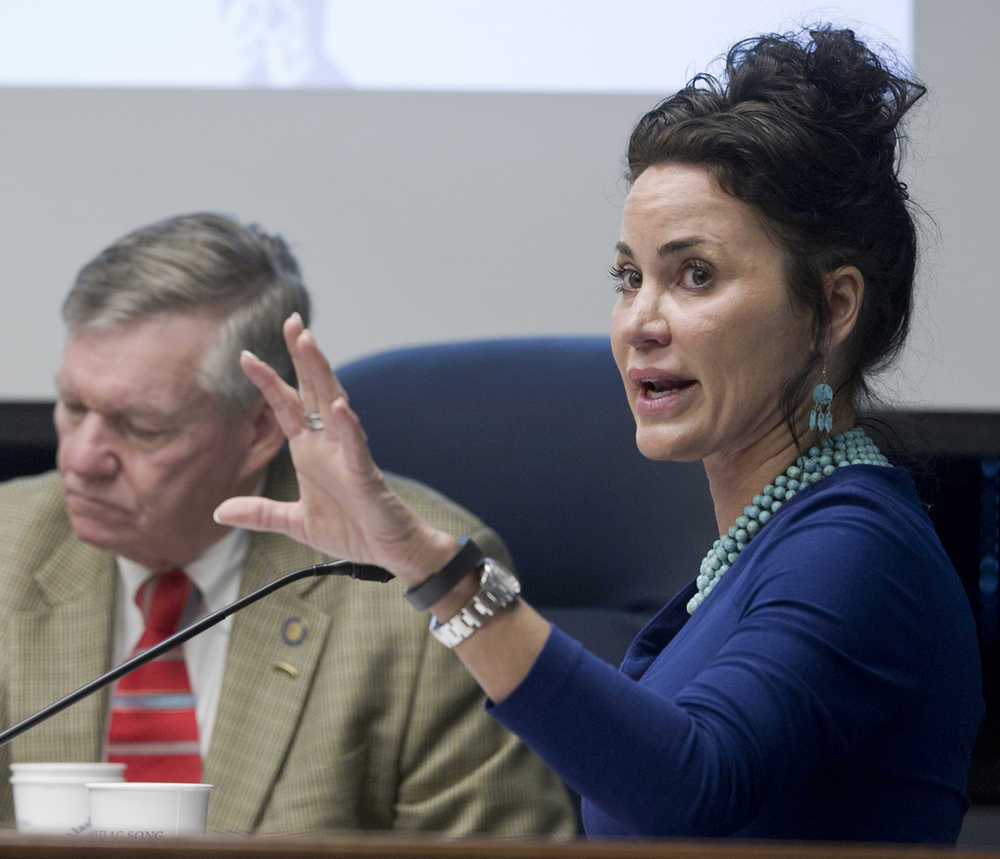The Alaska Senate voted late Monday to spend almost $1.8 billion per year from the Alaska Permanent Fund on the operations of state government.
If approved by the House, the action would erase about half of Alaska’s multibillion-dollar deficit but roughly halve the annual Alaska Permanent Fund Dividend.
Senate Bill 128, created by Sen. Lesil McGuire, R-Anchorage, is a key element in Gov. Bill Walker’s comprehensive plan to erase Alaska’s state deficit through spending cuts and new revenue.
Speaking on the Senate floor, McGuire said Alaska’s history has been driven by a simple equation: the price of oil multiplied by the throughput of the trans-Alaska Pipeline System.
When that equation is a large number, the state prospers and booms. Crime is down and employment is up.
When that equation is a small number, the state goes bust.
“That math is Alaska’s history. What we’re trying to do here today is correct that math,” she said, explaining that the measure provides financial stability to state operations that employ thousands of Alaskans and provide services statewide.
The bill does not touch the constitutionally protected corpus of the fund. It spends from the fund’s earnings reserve, which collects the proceeds of the fund’s investments.
The amount of the annual draw is calculated to be 5.25 percent, less than the fund’s long-term yield.
“This is not a raid on the Permanent Fund,” McGuire said.
Nevertheless, Alaskans will see some effects if the bill is approved by the Legislature. The earnings reserve is the account that pays Alaska’s annual dividend. If the reserve shrinks, so will dividend checks.
SB 128 keeps dividends at $1,000 for this year and the next two, then sets up an alternative formula for their distribution. Under the existing formula, the dividend would be $2,000 or more this year.
“Three years from now, if this bill passes, dividends will start to drop. People should know that,” said Sen. Berta Gardner, D-Anchorage.
Sen. Anna MacKinnon, R-Eagle River, responded that the drop would be to the $900 per-year range, well within averages since the dividend was established in 1982.
Furthermore, added McGuire, failing to act this year will lead to an end to the dividend by 2020. That’s because the state’s multibillion-dollar annual deficit is currently being funded from savings. When those savings accounts expire, so will the dividend
“The point I would like to make is we are living on borrowed time,” said Sen. Lyman Hoffman, D-Bethel. “The savings are only available to us for two more years, and we are going to be broke. We will not be able to pay our bills, and I believe that this year is the year to do it.”
The Senate vote was 14-5 about 8:45 p.m. Sen. Dennis Egan, D-Juneau, voted for the bill. The ‘no’ votes were a bipartisan coalition of opponents: Sen. Mike Dunleavy, R-Wasilla; Sen. Johnny Ellis, D-Anchorage; Sen. Berta Gardner, D-Anchorage; Sen. Bill Stoltze, R-Chugiak; and Sen. Bill Wielechowski, D-Anchorage.
Wielechowski said he couldn’t support the bill because the Legislature’s failure to cut oil and gas subsidies more deeply means money from the dividend will be going to oil companies. He also offered six other reasons, including the inequity of the cut. Poor Alaskans and children will be suffering a thousand-dollar cut, just as millionaires will.
Sen. Peter Micciche, R-Soldotna, said SB 128 isn’t a fix-all bill: It will not solve the entire deficit, and more must be done next year. “This doesn’t take the pressure off,” he warned.
Sen. Mike Dunleavy, R-Wasilla, disagreed. “I don’t think the pressure will be on to cut the budget next year,” he said.
After an election year, the Legislature will have new faces and possibly a new organization. It will take time for that new organization to arise and get accustomed to the way the Legislature works. That isn’t conducive to fast work, he said.
SB 128 is not expected to move quickly to completion this year. It must pass the House before it advances to Gov. Bill Walker, and in a House Finance Committee hearing Monday afternoon, Rep. Steve Thompson, R-Fairbanks, said a House version of a Permanent Fund spending bill likely will not be ready until next week.
That’s because lawmakers must take a break as thousands of Celebration guests arrive in Juneau: There aren’t enough hotel rooms and rental cars in Juneau for both lawmakers and guests.
If the House does approve of a Permanent Fund bill, that measure is likely to meet with the support of Gov. Bill Walker, who watched in person from the gallery as the Senate voted.
“I didn’t want to interfere with what they were doing in any way, but I wanted to be there,” he said. “Watching across the street on the big screen just isn’t the same as being there. This is a bit of a part of history, and I just wanted to be there.”

